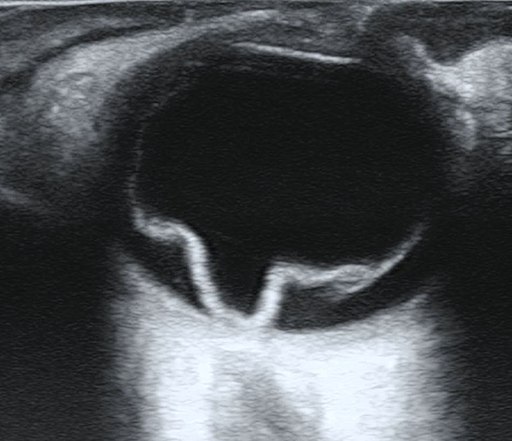

What is the retina?
What is retinal detachment?

Ultrasound of a retinal detachment in a patient presenting with complete vision loss and light perception only
Who is at risk of retinal detachment?
Detachment of the retina is more frequent in middle aged, short sighted people. However, it is quite uncommon and only about one person in ten thousand is affected. It is rare in young adults.What are the symptoms?
The most common symptom is a shadow spreading across the vision of one eye. You may also experience bright flashes of light and/or showers of dark spots called floaters. These symptoms are never painful.What is the treatment?
If you get help early, it may only be necessary to have laser or freezing treatment. This is usually performed under a local anaesthetic.How much vision can I expect after a successful operation?
This depends on how much the retina has detached and for how long.What happens after the operation?
You will be encouraged to get up and carry on as usual on the day after the operation, although sometimes you will be asked to keep your head in a particular position to help the healing process. Your eye specialist will prescribe eye drops and you will need to use these for a few weeks.What happens if the detached retina is not put back in place?
Most people will lose all useful vision if no operation is carried out, or if the treatment is unsuccessful. However, further treatment is usually possible if it does not succeed the first time. Occasionally, if the detachment involves the lower portion of the retina, some vision may recover by itself.Can retinal detachment be prevented?
If your family has a history of retinal detachment, or your doctor finds a weakness in your retina, then preventive laser or freezing treatment may be needed. However, in most cases it is not possible to take preventive action.What about my other eye?
If you have had a retinal detachment in one eye, you are at an increased risk of developing one in the other eye. But there is only about a one in ten chance of this happening.What if my sight is not as good as before?
You can be helped to see many of the things you used to by making use of your remaining sight. Low vision services can help. They can help you find the best magnifiers for you, and can give advice and training about the many, often simple, ways that you can make the most of your sight. Ask your eye specialist, optometrist (ophthalmic optician), GP, social worker or local voluntary organisation about low vision services near you. RNIB can also advise on the help that is available.